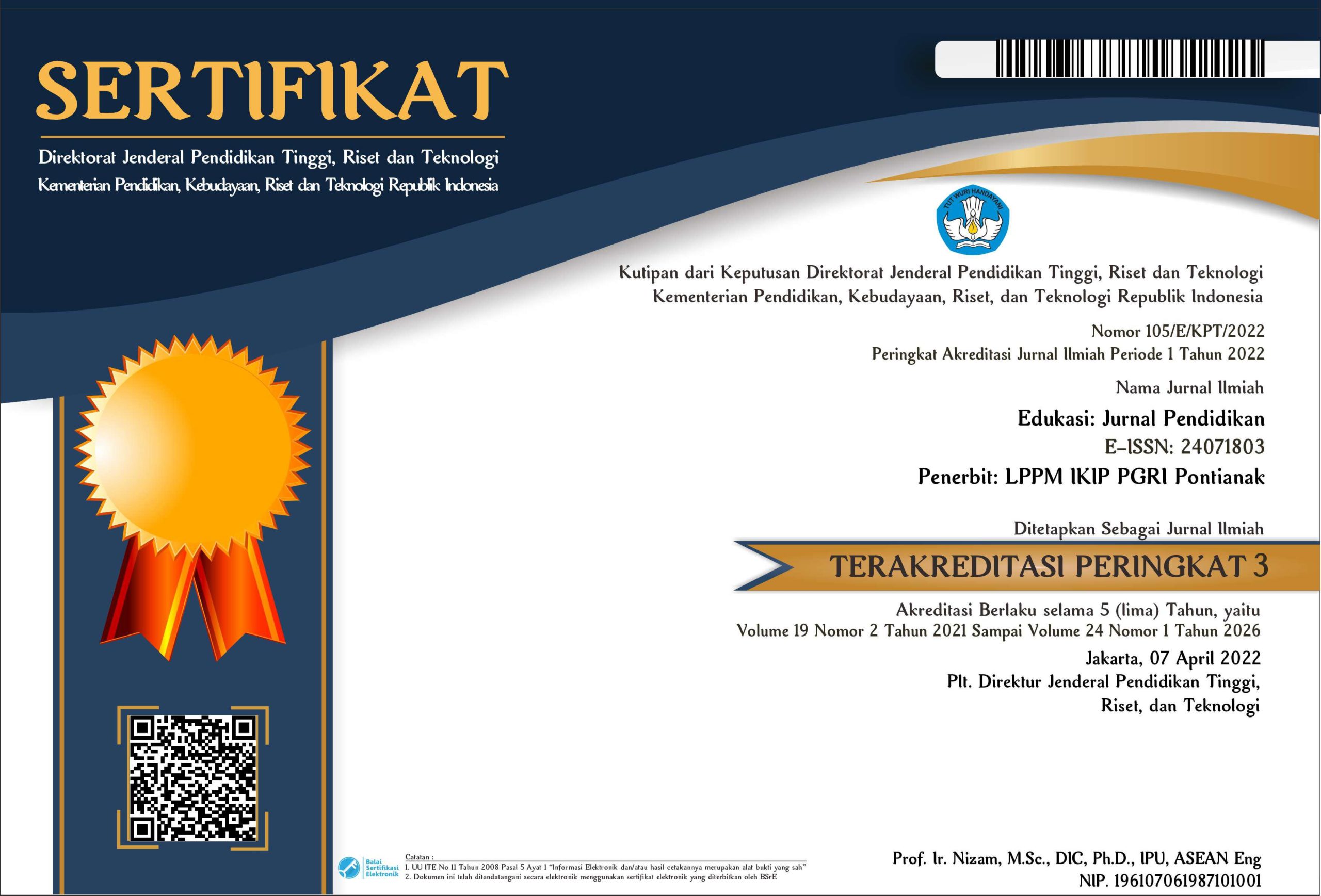Aplikasi Ujian Semester Berbasis Android bagi Siswa Sekolah Menengah Kejuruan
DOI:
https://doi.org/10.31571/edukasi.v20i1.3594Keywords:
evaluasi pembelajaran, ujian semester, aplikasi USER, Android, learning evaluation, USER applicationsAbstract
Abstrak
Penelitian bertujuan untuk menghasilkan aplikasi ujian semester berbasis Android bagi siswa sekolah menengah kejuruan (SMK) yang valid dan praktis. Penelitian menggunakan model pengembangan fourD dengan 4 (empat) tahapan, yaitu define, design, develop, dan dessiminate. Instrumen penelitian yang digunakan yaitu lembar validitas dan angket praktikalitas. Uji validitas produk dilakukan oleh 2 orang ahli media dan 11 orang ahli materi. Uji praktikalitas melibatkan siswa SMK N 8 Padang jurusan Teknik Komputer dan Jaringan yang berjumlah 68 orang. Hasil validasi menunjukkan bahwa aplikasi Ujian SEmesteR (USER) dinyatakan sangat valid dan sangat praktis. Berdasarkan hasil tersebut, disimpulkan bahwa aplikasi USERÂ dapat digunakan sekolah dalam melakukan evaluasi pembelajaran di setiap semesternya.
Â
Abstract
The research aimed to produce an Android-based semester exam application for vocational high school students that is valid and practical. The research used a fourD development model with 4 (four) stages, namely define, design, develop, and disseminate. The research instruments used validity sheets and practicality questionnaires. The product validity test was carried out by 2 media experts and 11 material experts. The practicality test involved 68 students of SMK N 8 Padang majoring in Computer and Network Engineering. The validation results showed that the SEmesteR Exam (USER) application was declared to be very valid and very practical. Based on these results, it is concluded that the USER application can be used by schools in evaluating learning in each semester.Downloads
References
Adiyasa, R. P., & Wirata, R. B. (2021). An Android Application to Increase Breast. International Journal of Nursing and Health Services, 4(1), 82-88.
Arpan, M., Budiman, R., & Verawardina, U. (2018). Need Assessment Penerapan Media Pembelajaran Pengenalan Hardware Jaringan Komputer Berbasis Augmented Reality. Edukasi: Jurnal Pendidikan, 16(1), 48-56. http://dx.doi.org/10.31571/edukasi.v16i1.834.
Ellis, S., & Barber, J. (2013). Expanding and Personalising Feedback in Online Assessment: A Case Study in A School of Pharmacy. Journal of Chemical Information and Modeling, 53(9), 1689-1699.
Frankl, G., Schartner, P., & Jost, D. (2018). The “Secure Exam Environmentâ€: E-Testing with Students’ Own Devices. Proceedings of the 11th IFIP World Conference on Computers in Education (WCCE) 2017. https://doi.org/10.1007/978-3-319-74310-3_20.
Kaymak, D. Z., & Horzum, M. B. (2013). Relationship between Online Learning Readiness and Structure and Interaction of Online Learning Students. Kuram ve Uygulamada Egitim Bilimleri, 13(3), 1792-1797. https://doi.org/10.12738/estp.2013.3.1580.
Li, X., & Li, Y. (2016). The Design and Implementation of Mobile Online Testing System based on Android Platform. Proceedings of the 2016 International Conference on Education, Management, Computer and Society 2016. https://doi.org/10.2991/emcs-16.2016.201.
Luciandika, A., Andajani, K., Ariani, D., & Mamah, M. (2021). Pengembangan Website “Sunting Pintar†sebagai Inovasi Pembelajaran Penyuntingan bagi Mahasiswa Berbasis Life Skill dan Entrepreneurship. Edukasi: Jurnal Pendidikan, 19(2), 260-274. https://doi.org/10.31571/edukasi.v19i2.2927.
Mahfudin, S., Sutanto, A., & Dacholfany. (2021). Implementasi Pembelajaran Berbasis Android (Studi Kasus di SMK Muhammadiyah se-Kota Metro Lampung). POACE: Jurnal Program Studi Adminitrasi Pendidikan, 1(1), 1-11. https://doi.org/10.24127/poace.v1i1.614.
Mhaiskey, M. P., Thombare, M. R., Patle, N. M., Gujarkar, K. S., & Rewatkar, A. (2021). Android APP for Online Examination and Results Systems. International Journal of Scientific Research & Engineering Trends, 7(3), 2395-2566.
Nurhayati, Yunus, Y., & Juwita, A. I. (2021). Perancangan dan Pembuatan Aplikasi Media Pembelajaran Berbasis Android pada Mata Pelajaran Produk Kreatif dan Kewirausahaan. Jurnal PTI (Pendidikan Teknologi Informasi), 8(1), 45-56.
Nyamawe, A. S., & Mtonyole, N. (2014). The Use of Mobile Phones in University. Exams Cheating: Proposed Solution, 17(1), 14-17.
Panyahuti, Ganefri, Ambiyar, & Suryani, K. (2019). Safe Exam Browser untuk Klien Android pada Ujian Berbasis Web. Edukasi: Jurnal Pendidikan, 17(2), 212-226.
Purwanto. (2016). Evaluasi Hasil Belajar. Yogyakarta: Pustaka Pelajar.
Putra, E. Y., & Pamungkas, S. (2020). Implementasi pelaksanaan ujian semester berbasis android dalam mata pelajaran sejarah di SMA Negeri 3 Kota Jambi. Jurnal Istoria, 4(1), 32-41.
Putra, R., & Siwi, M. (2021). Analisis Pelaksanaan Ujian Sekolah Berbasis Android (USBA). Jurnal Ecogen, 4(1), 62-71. http://dx.doi.org/10.24036/jmpe.v4i1.10907.
Putra, R. L., Maulana, A., & Iriani, T. (2019). Evaluasi Program Pelaksanaan Ujian Online dengan Menggunakan Learning Management System Moodle Berbasis Android di SMK Negeri 1 Jakarta. Jurnal PenSil, 8(1), 47-54. https://doi.org/10.21009/jpensil.v8i1.8483.
Rahayu, C., Putri, R. I. I., Zulkardi, & Hartono, Y. (2021). Games Pembelajaran Berbasis Android untuk Mendukung Curiosity Anak dalam Mengenalkan Matematika Awal. AKSIOMA: Jurnal Program Studi Pendidikan Matematika, 10(1), 1-14.
Rahmawati, A., Triwoelandari, R., & Nawawi, M. (2021). Pengembangan Media iSpring pada Pembelajaran IPA Berbasis STEM untuk Mengembangkan Kreativitas Siswa. Edukasi: Jurnal Pendidikan, 19(2), 304-318. https://doi.org/10.31571/edukasi.v19i2.3046.
Reuter, K., Halbherr, T., & Piendl, T. (2019). Competence-Oriented Exams Using Virtual Desktop Infrastructure (VDI). Zurich: Educational Development and Technology (LET).
Saregar, A., Zubaedi, Z., Parmin, P., Jamaludin, W., & Septiani, R. (2019). Feasibility Test Of Mobile Learning With Schoology: Efforts to Foster the Students’ Learning Interest on Magnetism. Journal of Physics: Conference Series, 1155(2019). https://doi.org/10.1088/1742-6596/1155/1/012060.
Senel, S., & Senel, H. C. (2021). Use of Take-Home Exam for Remote Assessment: A Case Study from Turkey. Journal of Educational Technology and Online Learning, 4(2), 236-255.
Sree, V. D., & Tepole, A. B. (2020). Computational Systems Mechanobiology of Growth and Remodeling: Integration of Tissue Mechanics and Cell Regulatory Network Dynamics. Current Opinion in Biomedical Engineering, 15(2020), 75-80. https://doi.org/10.1016/j.cobme.2020.01.002.
Sukadarmika, G., Hartati, R. S., Sastra, N. P., & Amrita, A. A. N. (2020). Developing Tamex Model for Availability Aspect of E-Exam Security in Wlan Environment. International Journal of Engineering and Emerging Technology, 5(1), 31-36. https://doi.org/10.24843/ijeet.2020.v05.i01.p07.
Surat Edaran Menteri Pendidikan dan Kebudayaan Republik Indonesia Nomor 4 Tahun 2020 tentang Pelaksanaan Kebijakan Pendidikan dalam Masa Darurat Penyebaran COVID-19 dalam https://pusdiklat.kemdikbud.go.id/surat-edaran-mendikbud-no-4-tahun-2020-tentang-pelaksanaan-kebijakan-pendidikan-dalam-masa-darurat-penyebaran-corona-virus-disease-covid-1-9/. Diakses 20 Maret 2022.
Tilchin, O., & Raiyn, J. (2015). Computer-Mediated Assessment of Higher-Order Thinking Development. International Journal of Higher Education, 4(1), 225-231. https://doi.org/10.5430/ijhe.v4n1p225.
Widyanto, R. A., & Artha, E. U. (2017). Ujian Online Berbasis SMS Gateway sebagai Media Assesment bagi Mahasiswa. Jurnal Informatika: Jurnal Pengembangan IT, 2(2), 36-42.
Wijayanti, T., Ruhadi, Hudaya, K. A. N., Hermawan, D., & Melynda. (2021). Star Mobile Apps: An Android-Based Learning Media to Support Paperless Policy and the Merdeka Belajar Program Implementation. Proceedings of the 6th International Conference on Education & Social Sciences (ICESS) 2021. https://doi.org/10.2991/assehr.k.210918.063.
Wolor, C. W., Solikhah, S., Fidhyallah, N. F., & Lestari, D. P. (2020). Effectiveness of E-Training, E-Leadership, and Work Life Balance on Employee Performance During COVID-19. Journal of Asian Finance, Economics and Business, 7(10), 443-450. https://doi.org/10.13106/jafeb.2020.vol7.no10.443.
Yang, W., Li, Q., & Wang, X. (2021). The Effect of Powerpoint Theme Color on Learners’ Learning Effectiveness and Emotions. Proceedings of the 2021 IEEE 24th International Conference on Computer Supported Cooperative Work in Design 2021. https://doi.org/10.1109/CSCWD49262.2021.9437633.
Downloads
Published
How to Cite
Issue
Section
License
Authors who publish in this journal agree to the following terms:
- Authors retain copyright and grant the journal the right of first publication with the work simultaneously licensed under a Creative Commons Attribution License (CC-BY-NC) that allows others to share the work with an acknowledgment of the work's authorship and initial publication in this journal.
- Authors are able to enter into separate, additional contractual arrangements for the non-exclusive distribution of the journal's published version of the work (e.g., post it to an institutional repository or publish it in a book), with an acknowledgment of its initial publication in this journal.
- Authors are permitted and encouraged to post their work online (e.g., in institutional repositories or on their website) prior to and during the submission process, as it can lead to productive exchanges, as well as earlier and greater citation of published work.

 Download: 771
Download: 771


















